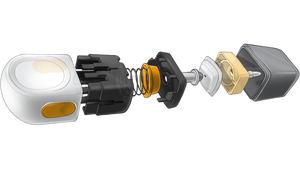Web-enabled auxiliary equipment unchains plastics processors
Conair continued its rollout of Web-enabled machine controls at PLASTEC West this week. After introducing the concept last year on some of its auxiliary equipment, the company chose the 2014 event to showcase its TrueFeed gravimetric blenders that now can be accessed via Internet-connected devices. Plastics processors are now free to move about the country and beyond, says Doug Brewster, Product Manager, Conveying.
February 13, 2014

Conair continued its rollout of Web-enabled machine controls at PLASTEC West this week. After introducing the concept last year on some of its auxiliary equipment, the company chose the 2014 event to showcase its TrueFeed gravimetric blenders that now can be accessed via Internet-connected devices. Plastics processors are now free to move about the country and beyond, says Doug Brewster, Product Manager, Conveying. "Anything you can do in front of your equipment, you can do from anywhere on the planet."
 Conair demonstrated the reach of its technology by connecting equipment running at its headquarters in Cranberry Township, PA, with an iPad at its booth at PLASTEC West. The control interface displaying on the iPad is identical to the one on the control panel of the machine, stresses Brewster. You can change settings, troubleshoot, and perform any number of other operations remotely as if you were on the shop floor. While this can be done as easily from a brauhaus in Bavaria as the convention center in Anaheim, most people tend to use the technology within their facility. "You don't have to leave your desk or run to the other side of the building to check on the equipment," says Brewster.
Conair demonstrated the reach of its technology by connecting equipment running at its headquarters in Cranberry Township, PA, with an iPad at its booth at PLASTEC West. The control interface displaying on the iPad is identical to the one on the control panel of the machine, stresses Brewster. You can change settings, troubleshoot, and perform any number of other operations remotely as if you were on the shop floor. While this can be done as easily from a brauhaus in Bavaria as the convention center in Anaheim, most people tend to use the technology within their facility. "You don't have to leave your desk or run to the other side of the building to check on the equipment," says Brewster.
If something does go awry on the shop floor, alerts from the material handling system, dryer, blender, feeder, or other peripheral can be automatically generated and delivered via email or text message to a device. The user can then log in via smartphone, tablet, or computer from almost anywhere and take a remote hard look at what's wrong. Changes can be made in real time to correct the situation. Controls with data-gathering capabilities also can generate reports that can be immediately exported to reporting software to facilitate process validation.
Planetary cutter produces clean cuts in small-bore medical tubing
Conair also introduced a travelling planetary cutter for processing precision small-bore medical tubing at PLASTEC West.
Compared with conventional cutting technologies, planetary cutters produce precise square cuts without shattering, whitening, or distortion. Conair demoed the system at the American Kuhne/Zumbach Electronics booth as part of a line that included a 12-mm extruder, self centering die, closed-loop dimensional control, and Medline vacuum cooling and sizing tank and puller/cutter. The latter device can automate inline cutting of many resins, says Conair, but processors often resort to offline manual cutting to ensure clean cuts of more brittle materials such as crystal polystyrene, HDPE, or highly filled resins. Planetary cutting makes it possible to automate the process even when difficult resins are being extruded.
In planetary cutting, the knife assembly rotates making a lathe-like cut around the circumference of the tube. Cutting debris is essentially eliminated, as is tubing distortion, according to Conair, leaving a clean, square cut that does not require secondary trimming or deburring.
While planetary cutting is not new, it has been used mainly to process large-diameter tubing and pipe. The technology can now be used to handle tubing in diameters as small as 0.080 in., achieving cut-to-length tolerances of ±0.015 in.
About the Author(s)
You May Also Like




